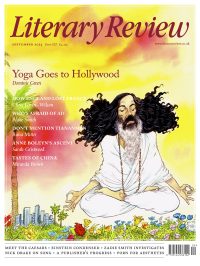Alan Jenkins
All His Trials
Nick Drake: The Life
By Richard Morton Jack
John Murray 562pp £30
If he’d lived another six months, Nick Drake would have joined the ‘27 Club’, the sad elite of popular musicians who died at twenty-seven, more or less by their own hands: Brian Jones, Jimi Hendrix, Janis Joplin, and so on. His talent, fragility and reliance on non-prescription props were almost certainly equal to theirs. In every other respect, though, he was their anti-type. His (mainly) blues- or classically-inflected folk songs are polished, tuneful, whimsical or wistful – and their shyly introverted composer was constitutionally unable to perform them before an audience of strangers. This, at a time when live gigs supported the release of an album rather than providing, as now, opportunities for selling ‘merch’, meant that sales of his records were extremely modest, and his music remained, in his lifetime, unknown to all but a very few: a fact that tormented him.
At twenty-one, Drake announced himself with Five Leaves Left. The title came from the warning in the cannabis smoker’s packet of Rizlas, an in-joke for the ‘heads’ who, it was reasonably assumed, might enjoy his songs or who had already heard and admired them: musically minded undergraduates and the smart London set Drake had fallen in with, spending afternoons and evenings in their flats, drinking tea, smoking joints and jamming. Now he dropped out of Cambridge, where he’d passed two years pretending to study Eng Lit, to pursue his musical vocation.
Three years and two albums later he was back at Far Leys, the family home in the Warwickshire village of Tanworth-in-Arden, suffering profound depression, exhibiting symptoms of psychosis and being anxiously cared for by his loving and supportive parents.To one old friend who went to see him, the reserve

Sign Up to our newsletter
Receive free articles, highlights from the archive, news, details of prizes, and much more.@Lit_Review
Follow Literary Review on Twitter
Twitter Feed
Under its longest-serving editor, Graydon Carter, Vanity Fair was that rare thing – a New York society magazine that published serious journalism.
@PeterPeteryork looks at what Carter got right.
Peter York - Deluxe Editions
Peter York: Deluxe Editions - When the Going Was Good: An Editor’s Adventures During the Last Golden Age of Magazines by Graydon Carter
literaryreview.co.uk
Henry James returned to America in 1904 with three objectives: to see his brother William, to deliver a series of lectures on Balzac, and to gather material for a pair of books about modern America.
Peter Rose follows James out west.
Peter Rose - The Restless Analyst
Peter Rose: The Restless Analyst - Henry James Comes Home: Rediscovering America in the Gilded Age by Peter Brooks...
literaryreview.co.uk
Vladimir Putin served his apprenticeship in the KGB toward the end of the Cold War, a period during which Western societies were infiltrated by so-called 'illegals'.
Piers Brendon examines how the culture of Soviet spycraft shaped his thinking.
Piers Brendon - Tinker, Tailor, Sleeper, Troll
Piers Brendon: Tinker, Tailor, Sleeper, Troll - The Illegals: Russia’s Most Audacious Spies and the Plot to Infiltrate the West by Shaun Walker
literaryreview.co.uk